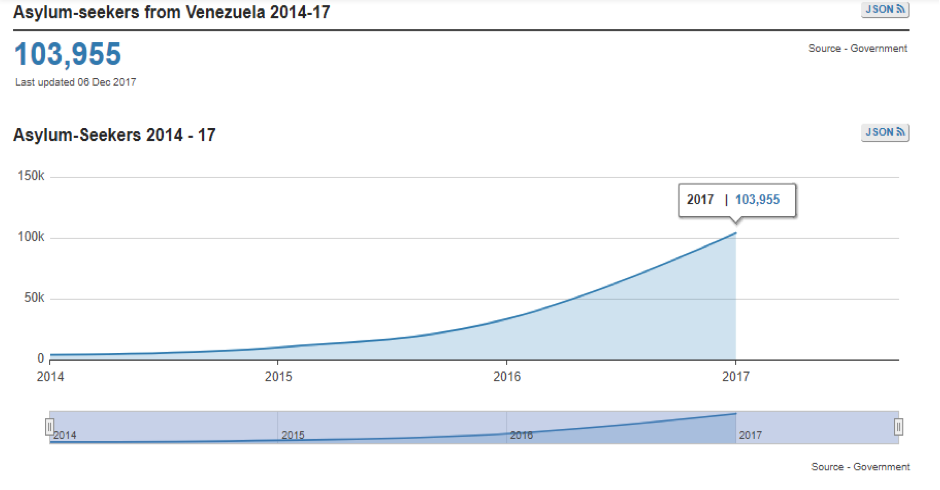A Tale of Two Maracaibos: Venezuelans Flee in Unprecedented Numbers
The numbers keep mounting: Venezuela’s migrant crisis is on a massive scale, and growing. With three million already gone, how many more people can we afford to lose?


Photo:El Nuevo Herald
Three million. That’s the best estimate for how many Venezuelans have left the country due to the crisis. The figure, put together by the Observatorio de la Diáspora Venezolana at the Universidad Central de Venezuela, is staggering. It was collected on the basis of work of researchers looking at official records in 90 countries and 400 receiving cities around the world.
A second figure that has been making the rounds is based on extrapolations from the results of a poll carried out by Consultores 21. It puts the number of Venezuelans in the diaspora now at 4 million. As we’d suspected, millions of Venezuelans have left our querido terruño.
To help you understand the magnitude of this exodus, it’s as if the entire city of my native Maracaibo moved out… twice. Estimates by the Observatorio de la Diáspora indicate that, ceteris paribus (that is, if the economic, humanitarian and social crisis doesn’t get worse) the projections on the number of Venezuelans leaving the country in 2018 should reach around 1.5 million. In just one year.
If that’s not a migration crisis, mi hermano, I don’t know what it is.
Let’s review the numbers.
According to data from the Office of the United Nations High Commissioner for Refugees (UNHCR) and the Inter-American Commission on Human Rights (IACHR), the asylum applications by Venezuelans increased 20,500%, from 505 in 2012 to 103,955 in 2017. It’s a hyperinflation of asylum seekers.
Source: United Nations Commissioner for Refugees, Operational Portal, https://data2.unhcr.org/en/situations/vensit [last accessed February 8, 2018].
The number of Venezuelans and Colombo-Venezuelans crossing the Puente Simón Bolívar has been making world news for weeks now. Migración Colombia reported that, by July 5, 2017, 455,000 Venezuelans had processed the Border Mobility Card (Tarjeta de Movilidad Fronteriza or TMF), which allows them to enter Colombian territory without the need for a passport, with 52% entering into Colombian territory to buy medicines or food.
Data indicates that a million Venezuelans had processed the Tarjeta by the end of the year, and we’re not counting the many Venezuelans entering through illegal passages and irregular transit routes that expose them to human trafficking networks, crime and violence.
In the United States, Venezuelans are the top nationality for asylum seekers, above China, Mexico, Guatemala and El Salvador. According to the U.S. Citizenship and Immigration Services (USCIS), in 2016 more than 18,000 Venezuelans submitted asylum applications, 150% more than in 2015 and six times the level observed in 2014. By the end of 2017, the number went up to 46,248, according to data from the office of the United Nations Commissioner for Refugees (UNHCR).
We even have balseros now, who would have thought?
Venezuelans are also arriving in Argentina, Peru and Chile. Our neighboring Brazil has actually been greatly affected by the flow of compatriots, especially in border cities like Boa Vista and Pacaraima. The most important concern for the Brazilian state is how to provide health services to immigrants, especially indigenous peoples who arrive malnourished, with HIV and other diseases allegedly eradicated.
What to do, what to do
The situation is dire. Displaced Venezuelans include vulnerable people like women, children, indigenous people, people with HIV, people with malnutrition and a host of other diseases, chronic in some cases. They arrive with no means to find a home, and often have a hard time finding jobs, already hard for nationals in receiving countries. We must also consider the risks associated with human trafficking and discrimination, xenophobia and just plain abuse.
Although the situation is hard, there are lots of us, Venezuelans in the diaspora, already thinking on how to make things better. The work cannot wait, because we’ve lost two Maracaibos already in the last few years. How many more can we afford?
* The views are personal and do not represent the position of the OAS.
Caracas Chronicles is 100% reader-supported.
We’ve been able to hang on for 22 years in one of the craziest media landscapes in the world. We’ve seen different media outlets in Venezuela (and abroad) closing shop, something we’re looking to avoid at all costs. Your collaboration goes a long way in helping us weather the storm.
Donate





